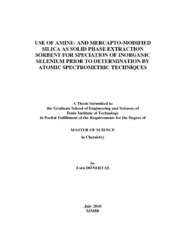Please use this identifier to cite or link to this item:
https://hdl.handle.net/11147/3055Full metadata record
| DC Field | Value | Language |
|---|---|---|
| dc.contributor.advisor | Eroğlu, Ahmet Emin | - |
| dc.contributor.author | Dönertaş, Esen | - |
| dc.date.accessioned | 2014-07-22T13:50:48Z | |
| dc.date.available | 2014-07-22T13:50:48Z | |
| dc.date.issued | 2010 | - |
| dc.identifier.uri | http://hdl.handle.net/11147/3055 | - |
| dc.description | Thesis (Master)--İzmir Institute of Technology, Chemistry, İzmir, 2010 | en_US |
| dc.description | Includes bibliographical references (leaves: 46-49) | en_US |
| dc.description | Text in English; Abstract: Turkish and English | en_US |
| dc.description | ix, 49 leaves | en_US |
| dc.description.abstract | Silica-based sorbents containing amino-, mercapto-, and both functional groups (bifunctional) were prepared and used for the sorption of inorganic Se(IV) and Se(VI) species from waters prior to their determination by atomic spectrometric techniques, namely, inductively coupled plasma mass spectrometry (ICP-MS) and hydride generation atomic absorption spectrometry (HGAAS). The presence of the functional groups on the surface of the silica was demonstrated by using several characterization techniques such as scanning electron microscopy (SEM), solid-state NMR spectroscopy, thermo gravimetric analysis (TGA), elemental analysis and Brunauer-Emmett-Teller (BET) surface area analysis. Amine-modified silica was found to be selective towards Se(VI) at pHs 2.0 and 3.0 whereas mercapto-modified silica retains Se(IV) over a wide range from acidic regions to pH 4.0. Bifunctional silica, on the other hand, possesses the good features of the two sorbents; it can be used in the separate sorption of Se(IV) or of both Se(IV) and Se(VI) species. Acidic pHs (<1.0) are convenient for the sorption of Se(IV) alone where no sorption is observed for Se(VI). Alternatively, pH can be adjusted to 2.0 or 3.0 and Se(IV) and Se(VI) can be retained simultaneously. Desorption of selenium species from the sorbents was realized with two different eluents; 0.2% (m/v) KIO3 in 1 M HCl was used for Se(IV) and 2.0 M HCl for Se(VI). The efficiency of the proposed sorbents was demonstrated through spike recovery tests carried out with bottled drinking and tap water samples and the percentage recoveries were found to change between 82.2 ± 7.1 and 109.4 ± 3.6 for Se(IV). For Se(VI), mechanically mixed amino- and mercapto-modified (MIX) silicas in (1:1) ratio has shown the best performance with percentage recoveries of 87.1 ± 3.6 and 74.5 ± 6.6 for the spiked bottled drinking and tap water samples, respectively. | en_US |
| dc.language.iso | en | en_US |
| dc.publisher | İzmir Institute of Technology | en_US |
| dc.publisher | Izmir Institute of Technology | en_US |
| dc.rights | info:eu-repo/semantics/openAccess | en_US |
| dc.subject.lcsh | Selenium | en |
| dc.subject.lcsh | Silica | en |
| dc.subject.lcsh | Selenium--Spectra | en |
| dc.subject.lcsh | Atomic spectroscopy--Technique | en |
| dc.title | Use of Amine-And Mercapto-Modified Silica as Soild Phase Extraction Sorbent for Speciation of Inorganic Selenium Prior To Determination by Atomic Spectrometric Techniques | en_US |
| dc.type | Master Thesis | en_US |
| dc.institutionauthor | Dönertaş, Esen | - |
| dc.department | Thesis (Master)--İzmir Institute of Technology, Chemistry | en_US |
| dc.relation.publicationcategory | Tez | en_US |
| dc.identifier.wosquality | N/A | - |
| dc.identifier.scopusquality | N/A | - |
| item.openairecristype | http://purl.org/coar/resource_type/c_18cf | - |
| item.cerifentitytype | Publications | - |
| item.fulltext | With Fulltext | - |
| item.languageiso639-1 | en | - |
| item.grantfulltext | open | - |
| item.openairetype | Master Thesis | - |
| Appears in Collections: | Master Degree / Yüksek Lisans Tezleri | |
Files in This Item:
| File | Description | Size | Format | |
|---|---|---|---|---|
| T000195.pdf | MasterThesis | 1.34 MB | Adobe PDF |  View/Open |
CORE Recommender
Page view(s)
222
checked on Apr 28, 2025
Download(s)
74
checked on Apr 28, 2025
Google ScholarTM
Check
Items in GCRIS Repository are protected by copyright, with all rights reserved, unless otherwise indicated.